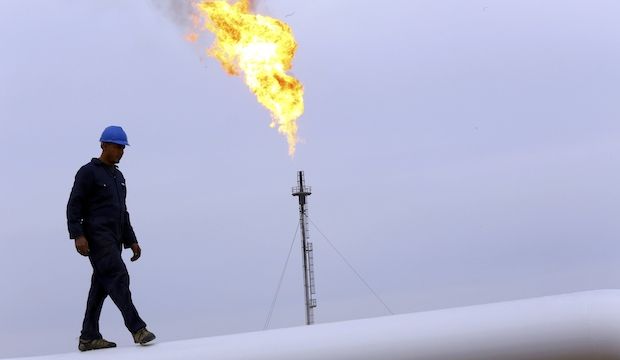
This file photo shows a worker walking on an oil pipeline at the Khurmala oil field on the outskirts of the city of Erbil, in Iraq’s Kurdistan region, on December 4, 2013. (Reuters/Stringer)
Deputy head of the Energy and Natural Resources Committee of the KRG, Dalshad Shaaban, said on Sunday that the KRG would now begin exporting “150,000 barrels per day of oil through SOMO”—Iraq’s state-owned oil company—once it received a 500 million US dollar loan from Baghdad.
The loan, Shaaban maintains, came as part of last Thursday’s agreement to end a months-long dispute between Iraq and Erbil over the latter’s independent export of oil.
He said Erbil expected to receive the funds “sometime during this week.”
The dispute began in January when the Baghdad government—then under the premiership of Nuri Al-Maliki—blocked Erbil’s share of the Iraqi budget and froze all public sector wages in the region after Erbil began exporting oil independently of SOMO.
Despite the agreement, however, Sherko Jawdat, the head of the Energy and Natural Resources Committee, told Asharq Al-Awsat it was still “too early to talk about the importance of Baghdad and Erbil reaching an agreement on [the export of] oil.”
“Both sides have reached a preliminary agreement, and have not gone into details until now,” he said. “There are many other points related to this issue that still need to be discussed. Both sides reaching this agreement represents the start of [discussions regarding] other issues.”
Aside from the export of the oil, these other issues include the question of oil reserves and wells currently disputed between the two sides.
Shaaban said that most of these wells had now stopped working “due to the damage caused to pipelines in light of the circumstances currently taking place in and around these areas.”
A number of oil wells and fields were captured by the Islamic State of Iraq and Syria (ISIS) during its advance across Iraq’s northern territories earlier this year. Some were subsequently damaged during US-led anti-ISIS airstrikes, which in addition to weakening the group’s military capacity, seek to block its sources of funding.
ISIS reportedly sells oil from captured wells and fields on the international black market.
Shaaban said the KRG was already at work repairing these damaged wells, as well as oil silos in Zammar and Ain Zalah, which were also damaged in the strikes.
He said the KRG had a right to 17 percent of the country’s oil fields, “as stipulated in the Iraqi budget.”
“For both sides [Iraq and Eril] to benefit [from the sale of oil], we need to reach an agreement stipulating that all oil from disputed areas should be exported through the KRG, because Baghdad can only export oil from these areas through Kurdistan,” he said.
“But this agreement has to guarantee we receive our full 17-percent share of oil. If we don’t reach an agreement with Baghdad in this regard, then in this instance it will be within our rights to take our share [from the sale of the oil] to cover the region’s financial commitments, and we will send the rest to Baghdad,” he added.

Trackbacks/Pingbacks